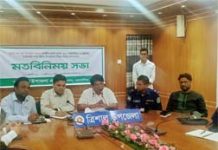C T Online Desk: As the country bears the brunt of the dengue outbreak, Chittagong is no exception, with worrying and skyrocketing figures.
The number of dengue cases in Chittagong surged alarmingly in a year, the government estimate shows, prompting concerns among health experts about the highly likely dire consequences if the situation is not effectively and immediately controlled.
On July 11 last year, a mere 39 infections were reported in Chittagong. But exactly a year later, the figure spiralled to 1,014 cases on Tuesday—a whopping 26-fold hike over the period.
Tuesday also saw a never-before-seen spike in dengue infections within a 24-hour period, with 198 new cases reported, according to the Directorate General of Health Services (DGHS).
This marks the highest number of single-day cases (127) logged on July 2.
If this upward trend persists, the number of dengue cases and fatalities in Chittagong is poised to reach an alarming level in the coming weeks, health experts and city residents fear.
The mosquito-borne disease has already claimed the lives of 13 individuals, including seven children and two women, in Chittagong this year.
District Health Supervisor Sujan Barua said that 198 patients are admitted to different hospitals in Chittagong currently
The scenario in the division
The dengue menace is also spreading outside the district.
Between January 1 and July 11 last year, there were only 95 dengue cases in 11 districts—except for Chittagong—of the Chittagong division.
As of July 9, the number of cases in the division climbed to 1,750. This clearly shows how the situation is worsening across the division.
Dengue has spread to 57 districts of the country, Health Minister Zahid Maleque said on Sunday.
Anti-mosquito drives
In response to the escalating crisis, the Chittagong City Corporation (CCC) has initiated a specialised mosquito eradication program aimed at eliminating mosquito breeding grounds.
The CCC has also employed drone technology to detect stagnant water in buildings and started imposing fines through mobile courts, against those responsible for the spread of Aedes mosquitoes. It is also distributing leaflets among city dwellers to raise awareness.
Additionally, a 100-day crush program is running in each ward under the CCC to eradicate mosquitoes.
CCC’s Chief Conservancy Officer Muhammad Abul Hashem emphasised the importance of public awareness alongside the ongoing 100-day mosquito eradication program to curb the spread of dengue.
A total of 435 areas in Chittagong have been identified as “risky”, and various mosquito-killing agents, including larvicides, are being sprayed, he said.
The CCC official insisted on mass awareness alongside their anti-mosquito drives to bring the dengue situation under control.
The activities come as experts attribute the dire situation to irregular rainfall, insufficient public awareness, and slow progress in mosquito control activities.
Free dengue tests
The city authorities inaugurated free dengue testing at the CCC General Hospital on Monday
Under this program, dengue identifying tests–NS1, CBC and platelet–will be conducted from 9am to 8pm every day until the situation is under control.
CCC’s Chief Health Officer Salim Akhtar Chowdhury advised individuals showing dengue symptoms to seek immediate testing and hospital treatment instead of relying on over-the-counter medication.
There is no specific treatment for dengue, according to the World Health Organization (WHO).
Most cases of dengue fever can be treated at home with pain medicine. Preventing mosquito bites is the best way to avoid getting dengue, Salim Akhtar said.













